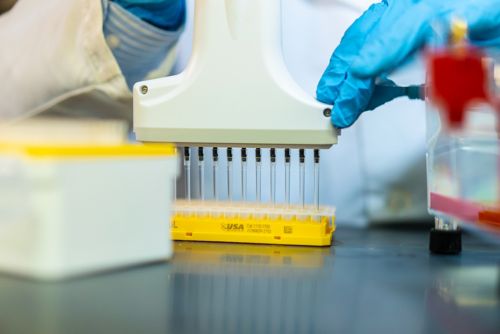St. Jude Family of Websites
Explore our cutting edge research, world-class patient care, career opportunities and more.
St. Jude Children's Research Hospital Home

- Fundraising
St. Jude Family of Websites
Explore our cutting edge research, world-class patient care, career opportunities and more.
St. Jude Children's Research Hospital Home

- Fundraising
Marta Derecka Lab
Studying transcriptional regulation of the bone marrow niche and the impact of stroma on the chromatin landscape of blood cells
About the Derecka Lab
Many research programs focus on the intrinsic factors that drive development of the hematopoietic system. Our laboratory, however, is interested in how the bone marrow microenvironment shapes the behavior and biology of blood cells. Changes in the microenvironment affect stem cells in normal and pathogenic conditions. We are exploring interactions between blood and stromal cells and how these relationships contribute to blood malignancies. We are also interested in understanding the impact of the bone marrow niche on the chromatin landscape in stem and progenitor cells.

Our research summary
Our laboratory focuses on extrinsic regulators of hematopoiesis, with a particular interest in the transcriptional regulation of the bone marrow niche. We are investigating how molecular alterations in the bone marrow microenvironment affect hematopoietic stem cells in steady state as well as in pathophysiological conditions like myeloproliferative disorders and myeloid leukemias.
One line of research in our laboratory focuses on the transcription factors that regulate the behavior of stromal cells. This is of particular interest because very few such transcription factors have been identified and, of those that are known, little is understood about their activity, how they direct the biology of stromal cells, and the resulting impact in blood malignancies.

Another line of research in our laboratory involves investigating cell adhesion molecules or cytokines that are important in the interaction between stromal cells and blood cells. This research builds upon our previous finding that a specific transcription factor called EBF1 regulates a broad adhesion program and the production of chemokines and cytokines that go on to have an impact on cell differentiation, migration, and adhesion. Our aim is to understand those interactions between the stromal and blood cells and ultimately develop new drugs and therapeutic approaches for blood cancers that might supplement existing treatment approaches.
Our laboratory has an emerging interest in how stromal cells prime blood cells that then undergo malignant transformation and affect the progression of cancer. Our previous research showed that stromal cells cause persistent alteration in the chromatin landscape of hematopoietic stem cells, and we are beginning to conduct mechanistic studies to explore the consequences of those changes.
Selected publications
About Marta Derecka
Dr. Derecka earned her MS, and PhD degrees from Jagiellonian University in Cracow, Poland, along with a graduate research fellowship at Virginia Commonwealth University. She completed her postdoctoral training at the Max Planck Institute of Immunobiology and Epigenetics in Germany. She joined St. Jude in 2020 and launched her laboratory-based program to study how changes and regulation in the bone marrow microenvironment may affect the development of stem cells.

Meet the team
Focused team of investigators exploring the role of the microenvironment in shaping blood cell biology.
-
View Details
Lyudmila Tsurkan, PhD
Lead Researcher
Contact us
Marta Derecka, PhD
Hematology
MS341
St. Jude Children's Research Hospital
Follow us

Memphis, TN, 38105-3678 USA GET DIRECTIONS
